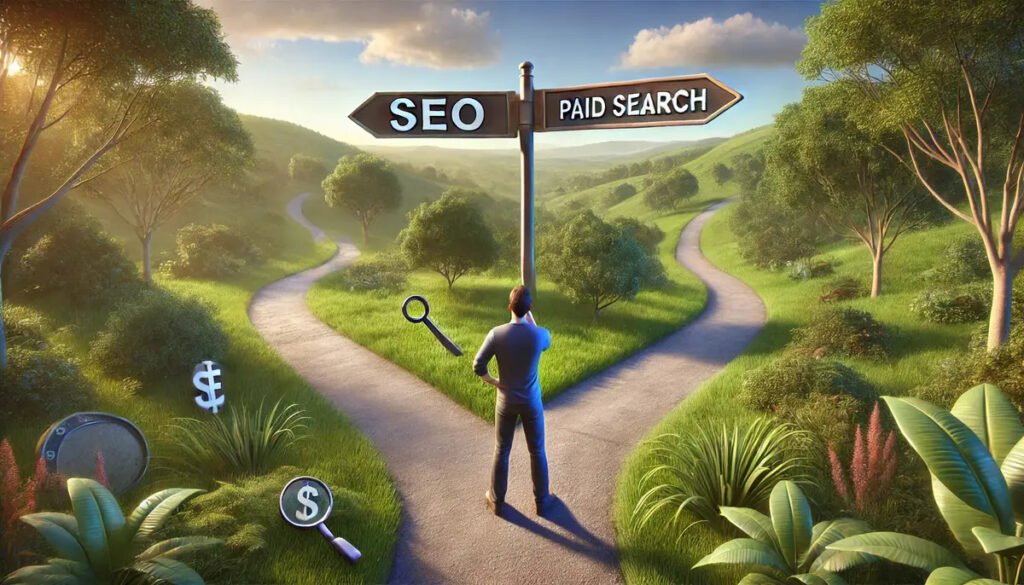Which Is Better Local SEO Or Paid Search?
In today’s online world, attracting local customers is essential for businesses with physical locations or targeting specific geographic areas. Two effective marketing strategies, local SEO (Search Engine Optimization) and paid search advertising, play key roles in enhancing your local online visibility. However, choosing between local SEO and paid search can pose a dilemma.
This detailed guide explores the advantages and limitations of both local SEO and paid search ads, guiding you to select the best strategy suited to your business goals and financial plan.

What Exactly Are Local SEO And Paid Search?
Local SEO is all about enhancing your online presence to achieve higher rankings in local search results. When someone looks up phrases like “best plumber near me” or “restaurants open late in [city],” local SEO ensures your business appears prominently in both the local map pack and organic search listings. This strategy focuses on improving your visibility to local customers actively seeking your services or products.
Paid Search, also known as Pay-Per-Click (PPC) advertising, revolves around creating targeted ads that appear on search engine results pages (SERPs) and across various websites. You incur costs only when someone clicks on your ad, making it a cost-effective method to connect with potential customers actively searching for what you offer. This approach allows for precise targeting and immediate visibility, helping you capture leads efficiently.

Key Differences Between Local SEO and Paid Search
Cost Considerations
Local SEO: Local SEO is a cost-effective strategy with enduring benefits. Initially, there may be expenses for professional optimization services to enhance your online presence. However, once optimized, achieving organic rankings does not necessitate continual expenditure per click.
Paid Search (PPC): Paid search involves ongoing budget allocation for advertising expenses. Each click on your ad incurs a cost, making it essential to continuously fund your ad campaigns to maintain visibility and engagement.
Understanding these cost dynamics helps businesses choose between sustainable organic growth with local SEO or immediate visibility through paid search, depending on their budget and marketing objectives.
Control Over Online Presence
Local SEO: Local SEO provides extensive control over your online presence. You can refine your website content, optimize your Google My Business (GMB) profile, and strategize to target specific local keywords effectively. This approach allows businesses to establish a strong organic presence tailored to their target audience’s search behavior and location.
Paid Search (PPC): Paid search offers precise targeting capabilities based on keywords, demographics, and other factors. However, your ad’s position and visibility on search engine results pages (SERPs) depend significantly on your bid amount and competition. While you have control over ad creatives and targeting parameters, maintaining top positions may require ongoing adjustments to bidding strategies and budgets.
Choosing between local SEO and paid search involves evaluating the level of control you seek over your online visibility and the immediate versus long-term cost-effectiveness of each strategy based on your business goals and budget constraints.
Results Comparison
Local SEO: Local SEO requires time to build momentum but offers sustainable, long-term benefits. By optimizing your online presence and local listings, you can attract consistent organic traffic over time. This strategy focuses on enhancing your website’s authority and relevance, gradually improving your rankings in local search results.
Paid Search (PPC): Paid search delivers immediate results by placing your ads in front of targeted audiences searching for specific keywords. This approach allows businesses to quickly reach a broader audience and drive immediate traffic to their website or landing pages. Results are directly tied to your advertising budget and the effectiveness of your ad campaigns in capturing clicks and conversions.
Choosing between local SEO and paid search hinges on your business objectives: seeking long-term organic growth with local SEO or achieving immediate visibility and traffic through paid search advertising. Each strategy offers distinct advantages based on your marketing goals and budget allocation.

Trying to Decide on the Right Approach? Consider These Key Factors
When deciding between Local SEO and Paid Search, consider the following key factors tailored to your business goals:
Business Goals
Local SEO
- Long-Term Organic Growth: Prioritizes sustainable, long-term organic growth by optimizing your online presence and local visibility. It focuses on improving your website’s authority, relevance, and local search rankings over time, attracting consistent traffic from local searches.
Paid Search (PPC)
- Immediate Brand Awareness: Ideal for businesses seeking immediate visibility and brand awareness. Paid search campaigns can quickly drive traffic to your website and generate leads through targeted ads on search engine results pages (SERPs).
Budget Considerations
Local SEO
- Cost-Effectiveness: Local SEO is generally cost-effective compared to paid search, especially in the long run. Initial investments may be needed for professional optimization services and ongoing efforts to maintain and improve your local search rankings.
- Ongoing Optimization: While local SEO doesn’t involve direct costs per click, ongoing optimization efforts, such as content updates, backlink building, and GMB profile management, may require budget allocation for optimal results over time.
Paid Search (PPC)
- Budget Allocation: Paid search requires a dedicated budget for ad spend, which can vary depending on your campaign goals, target keywords, and competitiveness in your industry.
- Cost Per Click: Each click on your paid search ad incurs a cost, making it essential to manage your budget effectively to maximize visibility and conversions.
Competition Considerations
Local SEO
- Long-Term Strategy: Local SEO requires consistent effort and time to establish and improve rankings in competitive local landscapes. It involves optimizing your online presence, including your website, Google My Business (GMB) profile, and local citations, to gradually build authority and attract organic traffic.
Paid Search (PPC)
- Immediate Visibility: In highly competitive industries and local markets, paid search provides a rapid method to differentiate and gain visibility. You can target specific keywords and appear prominently on search engine results pages (SERPs) through paid ads, ensuring immediate exposure to potential customers.
Target Audience Considerations
Local SEO
- Location-Specific Keywords: Ideal if your target audience frequently uses location-specific terms in their search queries (e.g., “plumbers near me” or “restaurants in [city]”). Local SEO optimizes your online presence to appear prominently in local search results, ensuring visibility to nearby customers searching for your products or services.
Paid Search (PPC)
- Keyword Targeting: Allows precise targeting of users actively searching for relevant terms, regardless of whether they include location-specific keywords. You can bid on specific keywords related to your business and create targeted ads to capture the attention of potential customers at the moment they are searching.
Consider how your target audience conducts searches and their intent when choosing between local SEO and paid search. If they commonly use location-specific queries, local SEO can effectively attract local customers. Alternatively, if your audience’s search behavior varies or includes broader terms, paid search offers flexibility to target relevant users across different search contexts. Align your strategy with how your audience searches to maximize engagement and conversions.
Choose the approach that best aligns with your business objectives: whether it’s achieving immediate brand visibility and lead generation with paid search or establishing a strong, enduring online presence and organic growth with local SEO. Each strategy offers distinct advantages based on your marketing goals and desired outcomes.

Combining Local SEO and Paid Search
Both local SEO and paid search advertising bring distinct advantages to your digital marketing strategy. Here’s why integrating these approaches can create a powerful synergy:
Achieve Maximum Visibility: Combine local SEO for sustained organic rankings with paid search for instant visibility during peak seasons or special promotions. This synergistic approach creates a potent strategy for attracting local customers effectively.
Boosted Brand Awareness: By leveraging both local SEO and paid search, your brand gains heightened visibility in local search results. This strategic approach ensures potential customers encounter your business across various search platforms, reinforcing brand familiarity and recognition.
Data-Driven Optimization: Paid search campaigns offer invaluable insights into user behavior and keyword effectiveness. This data empowers you to fine-tune your local SEO strategy, focusing on keywords that drive high conversions and resonate with your target audience.
Nevertheless, integrating both strategies demands meticulous planning and management to maintain a smooth user experience and prevent budget overruns.

Essential Steps for Local SEO and Paid Search Beginners
Local SEO
- Optimize Your Google My Business Profile: Begin by claiming and verifying your GMB profile. Ensure all details are accurate and complete. Encourage customers to leave reviews and regularly update your profile to maintain relevance.
- Build Local Citations: Secure listings on pertinent online directories and industry-specific platforms. Maintain consistent NAP (Name, Address, Phone Number) information across all listings to bolster local SEO effectiveness.
- Create Localized Content: Develop high-quality content tailored to local keywords and addressing local customer interests. Post blogs covering local events, provide community-focused insights, and showcase your industry expertise.
Paid Search
- Define Your Target Audience: Start by identifying your ideal customer and understanding their search habits and preferences.
- Keyword Research: Conduct comprehensive keyword research to pinpoint local keywords that have high search volumes and low competition.
- Craft Compelling Ads: Develop clear and concise ad copy that highlights your unique value proposition. Motivate users to click by emphasizing what sets your business apart.
- Track and Analyze Performance: Continuously monitor the performance of your paid search campaigns. Analyze key metrics such as click-through rate (CTR), conversion rate, and cost-per-acquisition (CPA). Use this data to refine and optimize your campaigns for better overall results.

Boost Your Success with Extra Tips
- Mobile-Friendliness: Optimize your website and landing pages for mobile devices. A substantial number of local searches are conducted on smartphones, so ensuring a seamless mobile experience is crucial.
- Customer Reviews: Actively encourage satisfied customers to leave positive reviews on your Google My Business profile and other relevant online platforms. Reviews play a significant role in building trust and credibility, benefiting both your local SEO and paid search efforts.
- Track Overall Results: Integrate your local SEO and paid search strategies. Monitor overall website traffic, lead generation, and sales to assess the combined impact of these efforts. Use this data to make informed decisions and optimize your marketing approach for maximum effectiveness.
Conclusion
Deciding between local SEO and paid search hinges on understanding your business objectives, budget constraints, and desired outcomes. Local SEO offers sustainable growth by optimizing your online presence and attracting organic traffic through local search results. It focuses on building authority over time, leveraging local keywords and optimizing your Google My Business profile to enhance visibility among nearby customers actively seeking your products or services.
On the other hand, paid search provides immediate visibility through targeted ads on search engine results pages (SERPs). It allows precise targeting based on keywords, demographics, and user intent, ensuring your ads reach potential customers searching for specific terms related to your business. While it requires ongoing investment for each click, paid search offers flexibility and quick results, making it ideal for businesses looking to boost immediate traffic and brand awareness.
To make an informed decision, assess your business goals—whether prioritizing long-term organic growth with local SEO or seeking immediate visibility and lead generation through paid search. Consider your budget allocation and the competitive landscape of your industry. Integrating both strategies can also maximize your digital marketing efforts, combining the sustainable benefits of local SEO with the immediate impact of paid search during promotional periods.
At Eclipse, we specialize in comprehensive digital marketing solutions, including SEO, Google Ads & PPC, Shopify SEO, and Web Design. Whether you’re aiming for long-term organic growth or immediate visibility, our tailored strategies can help you achieve your goals effectively. Contact us today to discuss how we can elevate your online presence and drive meaningful results for your business.
